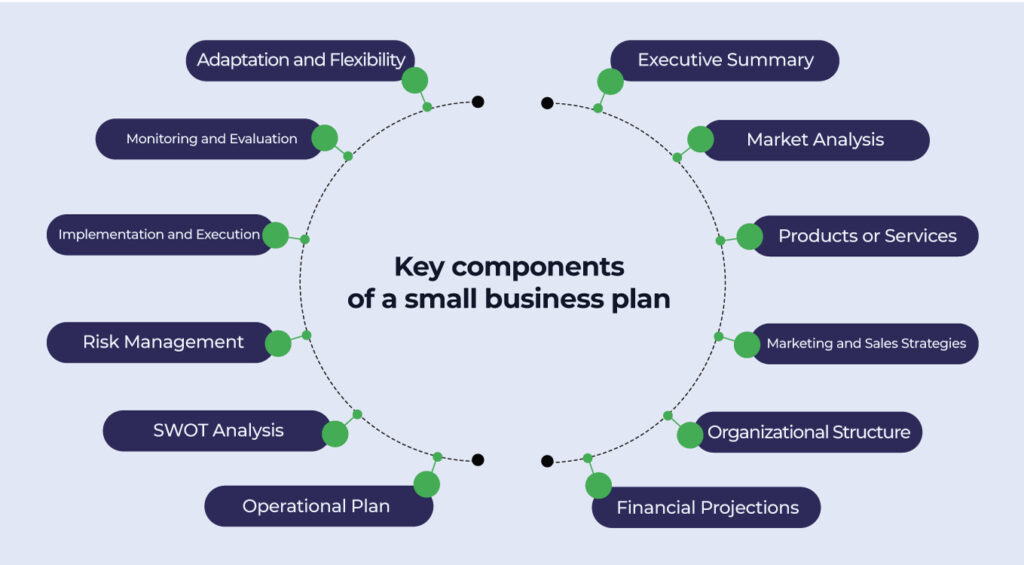Navigating Success with a Comprehensive Small Business Plan
In today’s dynamic business environment, for small businesses having solid small business plan ideas is crucial. It provides a clear direction and helps entrepreneurs make informed decisions. A comprehensive small-business plan serves as a blueprint, outlining the goals, strategies, and actions necessary to achieve success. By investing time and effort into developing a thoughtful plan, entrepreneurs can increase their chances of thriving in the marketplace.
- The Importance of a Business Plan
- Defining a Small-Business Plan
- Key Components of a Small Business Plan
- Setting Goals and Objectives
- Market Research and Analysis
- Identifying the Target Market
- Product or Service Offering
- Marketing and Sales Strategies
- Financial Planning and Forecasting
- Operational Plan
- Risk Management
- Implementation and Execution
- Monitoring and Evaluation
- Adaptation and Flexibility
- FAQs
- Conclusion
The Importance of a Business Plan
A comprehensive business plan plays a pivotal role in the process of fundraising, offering a vital roadmap for both startup founders and potential investors. From an investor’s perspective, a well-developed business plan serves as a crucial document that provides valuable insights into a company’s vision, strategy, market potential, and financial projections. It allows investors to assess the viability and profitability of a business, ultimately influencing their decision to invest. A meticulously crafted business plan showcases the founder’s commitment, strategic thinking, and understanding of the market landscape, instilling confidence in potential investors.
It provides a clear outline of the business’s objectives, target market, competitive advantage, and growth strategies, offering investors a comprehensive understanding of the company’s potential for success. Moreover, a business plan acts as a communication tool, enabling founders to articulate their business model, value proposition, and growth potential, thus facilitating meaningful conversations and building trust with potential investors. Ultimately, a well-structured and compelling business plan enhances the fundraising process by demonstrating the startup’s potential for growth, mitigating risks, and showcasing a clear path to profitability.
Defining a Small-Business Plan
Before delving into the details, let’s define what a small business plan actually is. A small-business plan is a written document that outlines the goals, strategies, and financial projections for a small business. It provides a roadmap for the business owner and key stakeholders, offering guidance on how to navigate challenges and capitalize on opportunities.
Key Components of a Small Business Plan
A well-structured small business plan typically includes the following key components:

Executive Summary: An overview of the business, its mission, and key highlights.
Company Description: Detailed information about the business, its legal structure, and ownership.
Market Analysis: Research and analysis of the target market, competition, and industry trends.
Products or Services: Description of the offerings, including unique selling propositions (USPs).
Marketing and Sales Strategies: Plans for reaching the target audience and driving sales.
Organizational Structure: Details about the company’s management team, staffing, and organizational hierarchy.
Financial Projections: Forecasts of revenue, expenses, and profitability, including startup costs and funding sources.
Operational Plan: Outlines the day-to-day operations, production processes, and key suppliers.
SWOT Analysis: Assessment of the business’s strengths, weaknesses, opportunities, and threats.
Risk Management: Strategies to identify and mitigate potential risks and uncertainties.
Implementation and Execution: An action plan for executing the strategies outlined in the plan.
Monitoring and Evaluation: Key performance indicators (KPIs) and methods to track progress and measure success.
Adaptation and Flexibility: The ability to adjust the plan as needed and stay agile in a dynamic market.
Now that we have a clear understanding of the components of a small business plan, let’s dive deeper into each section and explore how they each contribute to success.
Setting Goals and Objectives
Every successful business starts with clear goals and objectives. These serve as a destination, providing focus and direction for the company. When setting goals, it’s essential to ensure they are specific, measurable, achievable, relevant, and time-bound (SMART). Additionally, aligning the goals with the overall vision of the business helps create a cohesive and purpose-driven plan.
Market Research and Analysis
Conducting thorough market research is crucial for understanding the competitive landscape, identifying target customers, and recognizing market trends. This research involves gathering data on customer preferences, behavior, and purchasing habits, as well as studying the strategies and offerings of competitors. By analyzing this information, entrepreneurs can make informed decisions and develop effective marketing and sales strategies.
Identifying the Target Market
Defining the target market is a critical step in creating a small business plan. This involves identifying the specific demographics, psychographics, and characteristics of the ideal customers. Understanding the needs, pain points, and preferences of customers allows businesses to tailor their products or services to meet those requirements effectively.
Product or Service Offering
A key aspect of the small business plan is describing the unique selling proposition (USP) of the product or service. What sets the offering apart from competitors? How does it fulfill customer needs or solve their problems? Clearly articulating the value proposition and differentiating factors will help attract customers and create a competitive advantage.
Marketing and Sales Strategies
An effective marketing and sales strategy is essential for reaching the target market and driving revenue. This section of the plan outlines the channels, tactics, and messages that will be used to promote the business. It includes strategies for advertising, public relations, digital marketing, social media, and other relevant marketing channels.
Financial Planning and Forecasting
Financial planning plays a crucial role in the success of a small business. This section of the plan includes a detailed analysis of the startup costs, projected revenue, and expenses. It helps entrepreneurs understand the financial viability of the business and secure funding if necessary. Creating realistic financial forecasts is vital for managing cash flow, making informed investment decisions, and ensuring profitability.
At Easy Capraise, we offer various services to support your fundraising efforts, including writing pitch decks, providing presentation support, creating business plans, and consulting. Our expert team is dedicated to helping you create a top-quality pitch deck and deliver a successful presentation.
Operational Plan
The operational plan outlines the day-to-day activities and processes required to run the business. It includes information on the physical location, production methods, distribution channels, and key suppliers or vendors. Defining the operational structure and assigning roles and responsibilities ensures smooth operations and efficient execution of the business plan.
Risk Management
Running a business always carries a certain level of risk. The risk management section of the small business plan helps entrepreneurs identify and assess potential risks and uncertainties that could impact the business. It involves developing contingency plans and strategies to minimize or mitigate these risks. By proactively addressing potential challenges, entrepreneurs can better navigate unexpected situations and ensure business continuity.
Implementation and Execution
An effective small business plan is not just a document; it requires action and implementation. This section outlines the step-by-step actions that will be taken to execute the strategies and achieve the outlined goals. It includes timelines, milestones, and responsible parties to ensure accountability and progress tracking.
Monitoring and Evaluation
To measure the success of a small business plan, it is essential to establish key performance indicators (KPIs) and regularly monitor progress. This section outlines the metrics that will be tracked and evaluated to assess the effectiveness of the strategies. By monitoring these indicators, entrepreneurs can identify areas for improvement and make necessary adjustments to stay on track toward success.
Adaptation and Flexibility
Business environments are constantly evolving, and small businesses need to be adaptable and flexible. This section emphasizes the importance of being open to adjustments and changes in the plan based on market dynamics, customer feedback, and emerging trends. Continuous improvement and agility are key to sustaining growth and competitiveness.
FAQs
Why is a small business plan important?
A small business plan provides a roadmap for success, guiding entrepreneurs in making informed decisions and achieving their goals.
How do I conduct market research for my small business plan?
Market research involves gathering data on your target market, competition, and industry trends through surveys, interviews, and secondary research.
How often should I review and update my small business plan?
It’s recommended to review and update your small business plan at least annually or whenever there are significant changes in the business environment.
Can I get funding for my small business with a solid business plan?
Yes, a well-structured small business plan can significantly increase your chances of securing funding from investors, banks, or other financial institutions.
Is it necessary to hire a professional to help me create a small business plan?
While not mandatory, seeking guidance from a business consultant or mentor can provide valuable insights and ensure your plan is comprehensive and well-crafted.
How do I write a small business plan and implement a small business benefits plan?
Here’s a step-by-step guide on how to write a small business plan and implement a small business benefits plan:
Define your business concept and goals: Begin by clearly identifying your business concept, mission, and vision. Set specific goals that you want to achieve through your small business.
Conduct market research: Gather information about your target market, competitors, industry trends, and customer preferences. This research will help you understand the market landscape and make informed decisions.
Develop a marketing strategy: Outline your marketing and sales approach, including your target audience, promotional tactics, pricing strategy, and distribution channels. This section will help you identify how to reach and attract customers.
Create an organizational structure: Define the structure of your small business, including key roles and responsibilities. Identify the skills and expertise required for each position and consider your staffing needs.
Outline your products or services: Describe the products or services your business will offer and how they fulfill customer needs. Explain the unique selling points and competitive advantages of your offerings.
Develop a financial plan: Prepare a comprehensive financial plan that includes your startup costs, projected revenue, and expenses. Determine your pricing strategy, profit margins, and break-even point. This plan will guide your financial decision-making.
Implement a small business benefits plan: Research and identify the benefits and perks you want to offer to your employees. This could include health insurance, retirement plans, paid time off, and other incentives. Consider the budget and legal requirements while designing your benefits plan.
Seek professional guidance: If you’re unsure about any aspect of writing your small business plan or implementing the benefits plan, consider seeking advice from business consultants, mentors, or experts in the field.
Regularly review and update your plans: Your small business plan and benefits plan should not be static documents. Continuously review and update them to reflect changes in the market, industry, and your business goals. Stay flexible and adapt to new opportunities and challenges.
Conclusion
Navigating success as a small business owner requires a comprehensive and well-structured small business plan. By investing time and effort into creating a plan that covers all essential aspects, entrepreneurs can set themselves up for success. From setting clear goals and conducting market research to developing effective marketing strategies and managing finances, each component plays a vital role. Regular monitoring, evaluation, and adaptation ensure that the plan remains relevant and responsive to the ever-changing business landscape.
Contact us
Good to have you here! If you have any queries, please leave your message. Our team will reach out soon:)
.








